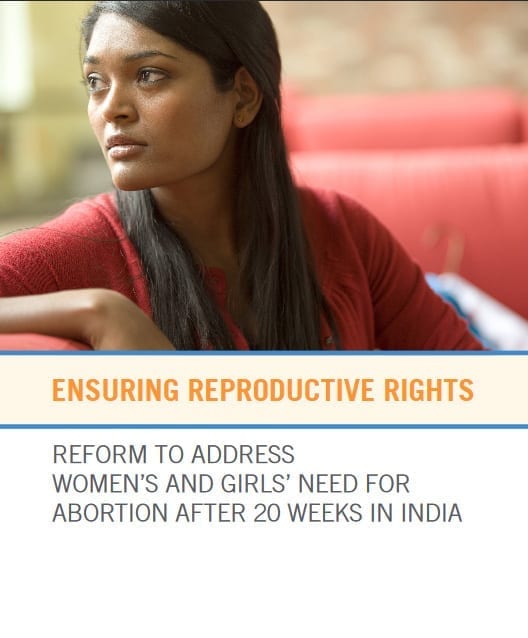Nepal Supreme Court: Abortion Is a Right
In a recent decision in the case of Lakshmi Dhikta v. Nepal, the Supreme Court of Nepal ruled that the country’s government must guarantee access to safe and affordable abortion services. Specifically, it affirmed the need for a comprehensive abortion law and emphasized the government’s obligation to ensure that no woman is denied a legal abortion just because she cannot pay for it.
The case, which was filed by the Forum for Women, Law and Development, Pro-Public and a group of human rights lawyers in February 2007, centers on Lakshmi Dhikta, an impoverished, rural woman. Lakshmi was unable to get a legal abortion when she became pregnant for the sixth time because she could not pay the required service fee – Nepali rupees 1130 (approximately 20 USD at the time). As a consequence, she was forced to carry her unintended pregnancy to term. Despite abortion being legal since 2002, and Nepal’s constitutional recognition of reproductive rights as fundamental rights, Nepali women, especially poor and rural women, are often unable to obtain abortions because of prohibitive fees, physically inaccessible facilities, and lack of knowledge of the legal status of abortion.
The court’s progressive decision explains its May 2009 order aimed at improving women’s access to abortion in Nepal.
The court’s decision provides the legal rationale for its May 2009 order and clearly anchors the right to abortion within national and international law and jurisprudence. Importantly, the court recognizes the right to abortion as an essential component of reproductive rights, indicating that a government cannot recognize reproductive rights generally and yet deny access to abortion.
The court boldly addresses specific arguments that seek to negate women’s reproductive rights:
A fetus does not have the legal status of a human life
The court explains that since there is no universal consensus defining when life begins, and because Nepalese law does not distinguish fetal rights, it will not recognize the fetus as a human life. Further, the court notes that since there is no fetus without a mother, there can be no infringement of a woman’s right to physical and mental health and well-being in the name of a fetus, the fetus cannot supersede the protection of a woman’s physical and mental health and well-being. The decision provides several examples to demonstrate that the recognition of any right before birth would be inconsistent with this and violates a myriad of women’s fundamental human rights. Interestingly, the Supreme Court of Nepal cites in its decision Roe v. Wade, noting that the United States Supreme Court did not recognize the fetus as a human life.
The right to abortion is central to the right to equality and non-discrimination
The court recognizes the inextricable link between the right to abortion, the right to equality, and the right to freedom from discrimination. It points out that just as the law does not force a man to use his body in certain ways, a woman should not be forced to use her body in ways she does not want to. Further, the court recognizes that the denial of a legal abortion results in forced pregnancy and childbirth. This, in turn, causes irreparable harm to women and violates many of their fundamental human rights.
A woman has a right to privacy when deciding to have an abortion
The court also affirms a woman’s right to privacy in matters of abortion by describing pregnancy as a woman’s personal matter.
A comprehensive abortion law is needed to fully protect women’s rights
The legal provisions for abortion currently reside in the chapter on life in the National Code (Muluki Ain). Punishments for crimes against human life such as murder are also found in this section, implicitly identifying abortion as a crime akin to murder. In its decision, the Court makes it clear that a woman’s reproductive capacity cannot be used against her, and can in no way be grounds to punish her. Based on the fact that the court has not recognized the fetus as a human life, the Court states that legal provisions on abortion must be contained in a separate law and disassociated from discussion of murder.
Compensation is warranted when a woman is forced to continue an unwanted pregnancy
The Nepal Supreme Court does not directly compensate Lakshmi for her suffering arising from the forced continuation of pregnancy in this case, as compensation would have to be sought through a civil claim in a lower court. However, the Court does recognize compensation as being justified in such cases on account of the irreparable harm caused to women when they are forced to carry an unwanted pregnancy to term. It references two of the Center’s cases, Tysiac v. Poland and Paulina v. Mexico, to do so, both these cases sought and successfully obtained compensation for its plaintiffs. The Center provided support in developing Lakshmi Dhikta v. Nepal and drafting the petition and subsequently submitted a memo. Melissa Upreti, Senior Regional Manager and Legal Advisor for Asia, was a co-petitioner. This decision marks another major achievement for the Center’s global litigation campaign launched in 2006. (The information contained herein is based on an unofficial translation of the Supreme Court’s decision.)

